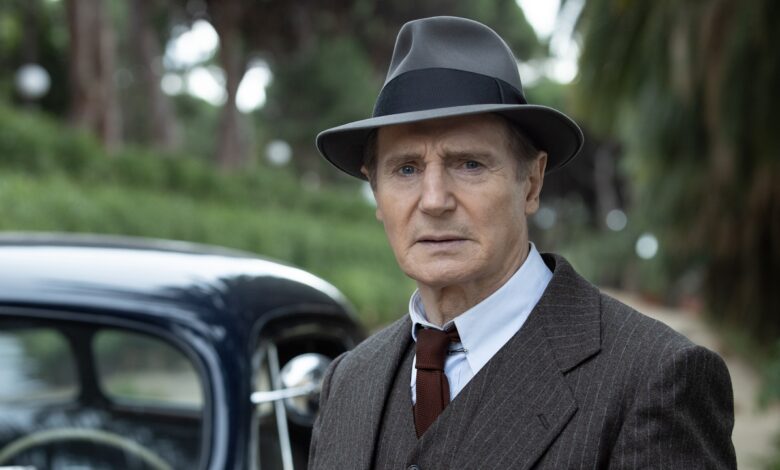Review Marlowe – Review on FilmTotaal


Director: Neil Jordan | Script: William Monahan, Neil Jordan | Cast: Liam Neeson (Philip Marlowe), Diane Kruger (Clare Cavendish), Jessica Lange (Dorothy Quincannon) ea | Time to play: 109 minutes | Year: 2023
When Raymond Chandler created his Marlowe character, he probably never imagined that it would still be used nearly a century later. His fictional private detective first appeared in the pulp magazine Black Mask, but only gained popularity from the books in the late 1930s. Since then, Chandler’s creation has inspired numerous books, radio shows, talk shows, television and movies. Writer John Benville has also run away with the character. Marlowe is the adaptation of his book and Liam Neeson celebrates his 100th film by following in the footsteps of earlier artists such as Humphrey Bogart and Elliot Gould.
True to the noir genre, the film opens in a dimly lit room, where the name and position on the milky white glass of the door reveal that we are in Detective Marlowe’s office. It is 1939 in Hollywood, Los Angeles. As light from the blinds plays with the cigarette smoke, attractive heiress Clare Cavendish hires Marlowe to track down her missing lover, Nico. He accepts the job and soon discovers that Nico has lost his life. However, the circumstances are suspicious and the clue leads him to the very exclusive Corbata club.
The sleazy establishment doesn’t expect snoops and keeps its doors locked tight. Business sucks and clearly there is more. Luckily, Marlowe can’t be pinned down a hole, and it throws him into some old-fashioned detective work, pitted against dirty cops, trigger-happy gangsters, and Hollywood’s moneyed elite. From dialogue to dialogue, and clue to clue, he works his way to the bottom of the mystery. However, as the plot thickens, it becomes increasingly clear that this very plot falls far short.
The movie basically contains all the elements you’d expect from a detective noir; old cars, whiskeys without ice, endless cigarettes, dark nightclubs, neon lights flashing on rainy nights, ominous trench coats under tilted fedoras, tommy guns, faceless thugs in double-breasted suits, a femme fatale with a double agenda, games of horizontal shadows, a sepia color palette and finally, of course, the single detective with an honest and misanthropic disposition. Only the melancholic voice-over is missing.
Succeeds on the surface Marlowe therefore quite good at recreating the characteristic atmosphere of classics such as Chinatown in The big dream catch. This is due in part to Xavi Gimenez’s strong cinematography. By avoiding sweeping ambient shots and focusing on timeless, non-location elements like palm trees and classic cars, he manages to create compelling 1930s Hollywood with limited resources. Bolstered by David Holmes’ fantastic score, the atmospheric visuals make you long for days gone by. Unfortunately, these nostalgic feelings are negated by the colorless script.
In his ambition to emulate the look of the classics, director Neil Jordan has lost sight of the fact that a good detective film stands or falls with an intriguing mystery. The dialogue itself is very well written and the acting is mostly good, but Marlowe’s quest is about as intriguing as the list of ingredients on a bottle of water. At no point does the film even remotely become suspenseful and there is nothing at all that invites the viewer to get involved in the story. Unfortunately, Liam Neeson’s uninspired take on the title character doesn’t help matters either.
Unlike his unwavering moral compass, Marlowe doesn’t have any inner drive, which makes it difficult for Neeson to color the character. What is probably supposed to convey a cynical and gruff mindset comes off as indifference due to Neeson’s lack of empathy. This makes it hard to relate to the character. The other characters are also not developed enough and never rise above the cartoon level. It’s loose-lipped pawns that give our detective his next clue, or extremely clichéd “potholes” that get in the way of his investigation. This may have worked with the classics, but now it feels stale.
Thus, Jordan does nothing original with the rich source material and fails to bring the film into the 21st century. The end result is an uninspired repetition exercise that he loses out to the classics he tries to emulate. Marlowe it’s a hodgepodge of potentially interesting but poorly developed ideas that don’t form a coherent whole due to the poor script. It’s a shame Neeson has to celebrate his anniversary with this empty shell of a noir thriller. That said, it’s basically your typical Liam Neeson movie and fans of the actor can treat themselves in that regard.